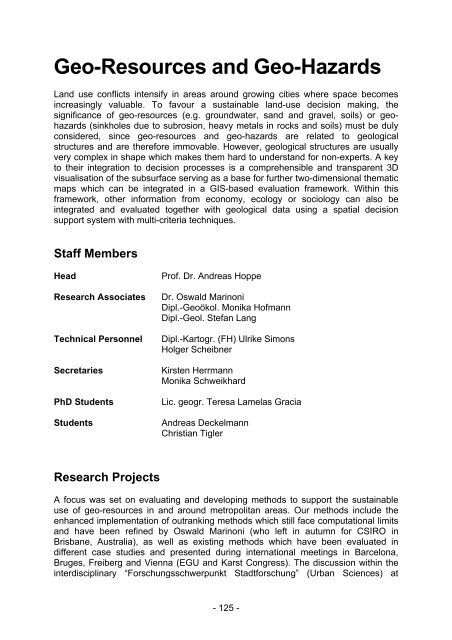Electronic Material Properties - und Geowissenschaften ...
Electronic Material Properties - und Geowissenschaften ...
Electronic Material Properties - und Geowissenschaften ...
Create successful ePaper yourself
Turn your PDF publications into a flip-book with our unique Google optimized e-Paper software.
Geo-Resources and Geo-Hazards<br />
Land use conflicts intensify in areas aro<strong>und</strong> growing cities where space becomes<br />
increasingly valuable. To favour a sustainable land-use decision making, the<br />
significance of geo-resources (e.g. gro<strong>und</strong>water, sand and gravel, soils) or geohazards<br />
(sinkholes due to subrosion, heavy metals in rocks and soils) must be duly<br />
considered, since geo-resources and geo-hazards are related to geological<br />
structures and are therefore immovable. However, geological structures are usually<br />
very complex in shape which makes them hard to <strong>und</strong>erstand for non-experts. A key<br />
to their integration to decision processes is a comprehensible and transparent 3D<br />
visualisation of the subsurface serving as a base for further two-dimensional thematic<br />
maps which can be integrated in a GIS-based evaluation framework. Within this<br />
framework, other information from economy, ecology or sociology can also be<br />
integrated and evaluated together with geological data using a spatial decision<br />
support system with multi-criteria techniques.<br />
Staff Members<br />
Head Prof. Dr. Andreas Hoppe<br />
Research Associates Dr. Oswald Marinoni<br />
Dipl.-Geoökol. Monika Hofmann<br />
Dipl.-Geol. Stefan Lang<br />
Technical Personnel Dipl.-Kartogr. (FH) Ulrike Simons<br />
Holger Scheibner<br />
Secretaries Kirsten Herrmann<br />
Monika Schweikhard<br />
PhD Students Lic. geogr. Teresa Lamelas Gracia<br />
Students Andreas Deckelmann<br />
Christian Tigler<br />
Research Projects<br />
A focus was set on evaluating and developing methods to support the sustainable<br />
use of geo-resources in and aro<strong>und</strong> metropolitan areas. Our methods include the<br />
enhanced implementation of outranking methods which still face computational limits<br />
and have been refined by Oswald Marinoni (who left in autumn for CSIRO in<br />
Brisbane, Australia), as well as existing methods which have been evaluated in<br />
different case studies and presented during international meetings in Barcelona,<br />
Bruges, Freiberg and Vienna (EGU and Karst Congress). The discussion within the<br />
interdisciplinary “Forschungsschwerpunkt Stadtforschung” (Urban Sciences) at<br />
- 125 -


